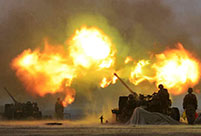 Top 100 beauties in the world!
Top 100 beauties in the world!
 Gallery: Who is the most beautiful one?
Gallery: Who is the most beautiful one?
 If you like autumn, put your hands in the air!
If you like autumn, put your hands in the air!
 Fan Bingbing's "Queen style" in new play
Fan Bingbing's "Queen style" in new play
 Lingerie show at 2014 Miss China
Lingerie show at 2014 Miss China
 J-10 fighters show aerobatic stunts in smog-free sky
J-10 fighters show aerobatic stunts in smog-free sky
 Charming contestants of Shanghai Int’l Model Contest
Charming contestants of Shanghai Int’l Model Contest
 Most amazing chi-pao beauties
Most amazing chi-pao beauties
 7 deadly animal attacks
Russia to launch 70 Proton rockets by 2020: official
7 deadly animal attacks
Russia to launch 70 Proton rockets by 2020: officialIf our future is not to be dulled by the dead weight of the past, then a clearheaded prioritization of the issues of the 21st century needs to be undertaken. This means keeping Asia - and thus China - at the top of the list in the global conversation. So US President Barack Obama's diplomatic trip to Asia this week is welcome indeed.
Listen to what Asia might have to say
President Obama has only two years of his eight-year presidency left but that's enough time for a more original, deeper contribution to the China-US history book than he has made so far. An eventual hot war between the two would not only be unaffordable but would be injurious to everyone. A better China policy by the US would be a kind of global affordable care act.
Up to now the much-hyped US "pivot" to Asia has been almost a self-deception, with Washington's mental energies glued to Syria far more than, for example, strategically situated Singapore. Thanks to the all-consuming domestic political pressures, rather than any lack of common sense, Washington is still ensnared in the miseries and poisons of the past. This has led to missed opportunities for carefully thought out China initiatives to be drawn up and implemented. Instead of continuing to be absorbed by the Middle East, Obama and his team over the next two years should spend more of their foreign-policy energy on Asia. There should be no reverse pivot back.
It is utterly foolish to assume that Chinese President Xi Jinping and Premier Li Keqiang don't have much to offer; in fact they impress almost everyone as being very capable indeed. And it is absolutely stupid to believe that simply because they are of the Communist persuasion they shouldn't be consulted and listened to by the US president and his team as often as their attention can be engaged. Only the moral infant - or the intellectually insecure - is attentive only to those with whom basic agreement is foretold, or easy to achieve.
Our diplomacy needs to get out from underneath the intellectual sloth of its bureaucracies and mix it up more with people who can bring something new to the table. In fact, there are a number of Asian leaders, especially Singapore's Lee Hsien Loong, Indonesia's Joko Widowo and the Philippines' Benigno Aquino, who can offer America different and invaluable perspectives. The world, as we all know, is now all but a universal global entity. We really all are in this together.
Let us listen more to others. After all, with unprecedented rapidity and scale, China ought to win some sort of global prize for so dramatically improving the economic lot of its 1.36 billion people. What the sprawling nation has accomplished in the last three decades is almost unbelievable - and probably unprecedented. On the tiny population end of the scale, of course, there is Singapore, which deserves some sort of global award for the best overall selection and implementation of national public policy over many decades. It has been some show there. The Philippines doesn't get much positive publicity, of course, but it has been making healthy strides, and resolutely deserves Washington's notice for remaining a democracy. Even the Democratic People's Republic of Korea, which has now dramatically released two captive Americans, finally looks to be considering joining the Asian parade. Indonesia is home to more Muslims than any other country - might not its new president be worth America's rapt attention on certain issues?
Huge obstacles threaten to derail the through-train to the future. The list - from the troubling unsettlement in Hong Kong (a situation which Beijing needs to negotiate further along careful lines) to the ever-present potential of religious extremism throughout the region - is long. But only one issue consistently merits top ranking. That is the relationship between China and America.
Sure, the governing elites of both countries should be able to maintain it at a minimum level - say, at least above the boiling point. But is that the best that we can do? Inspired statesmanship on both sides of the Pacific needs to raise the relationship to new heights. That's the real test for the governments in Beijing and Washington - taking it to the next level when many others seems pessimistic and tired and stuck in the past.
This is the challenge of our epoch. As far as I am concerned, the presidents of America and China cannot meet often enough. What's more important? Crossing into the frontiers of the 21st century means taking on the challenges of the new. The new now is the rise of Asia - led by China. It's rather obvious if you stop to think.
The author has written many books about Asia, from Conversations with Lee Kuan Yew to the current In the Middle of China's Future: Tom Plate on Asia. The veteran journalist recently completed a three-city lecture tour of China.
 World Pole Dance Championship in China
World Pole Dance Championship in China In pics: PLA stages live-fire drill in NE China
In pics: PLA stages live-fire drill in NE China  59-year-old Liu Xiaoqing still looks stunning
59-year-old Liu Xiaoqing still looks stunning  Standard faces for each countries in the world
Standard faces for each countries in the world Shocking! Photos of Chinese fighters revealed
Shocking! Photos of Chinese fighters revealed Images of angels in white: At work v.s off work
Images of angels in white: At work v.s off work  Post-85s female pilots and their mission
Post-85s female pilots and their mission Netizens fall in love with champion swimmer Ning Zetao
Netizens fall in love with champion swimmer Ning Zetao Vibrant 21-year-old and her own Cheongsam brand
Vibrant 21-year-old and her own Cheongsam brand Top 10 most dangerous jobs in the world
Top 10 most dangerous jobs in the world  Top 10 fifth generation jet fighters in the world
Top 10 fifth generation jet fighters in the world Top 10 Chinese goddesses
Top 10 Chinese goddesses  Top 20 hottest women in the world in 2014
Top 20 hottest women in the world in 2014 Top 10 pure beauties in showbiz
Top 10 pure beauties in showbiz  Top 10 world's highest-paid models 2014
Top 10 world's highest-paid models 2014 The most gorgeous Chinese women
The most gorgeous Chinese women Top 10 most handsome faces in Asia
Top 10 most handsome faces in AsiaDay|Week|Month